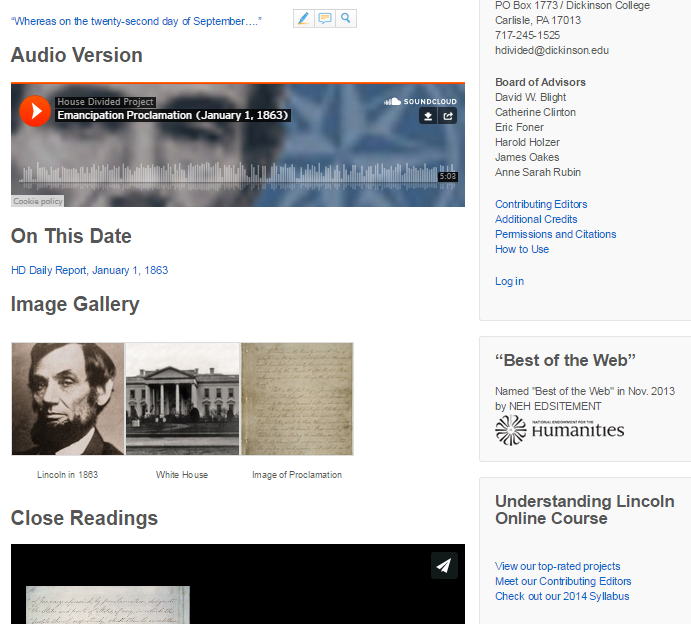Summer 2013 plans for House Divided include the creation of an audio archive of Abraham Lincoln’s selected writings, a series of short, instructional videos featuring Prof. Matthew Pinsker teaching key documents from the Civil War era, increased alignment with the Common Core Standards for Social Studies literacy, and the launching of Dickinson’s first open online course.

Since its public launch in 2011 at the start of the Civil War 150th anniversary, Dickinson’s House Divided project, directed by Prof. Pinsker, has experienced more than 500,000 visitors and over two million page views across its network of two dozen websites.
Its research engine contains 11,000 public domain images and tens of thousands more historic documents and records. The other related sites, such as digital classrooms, special exhibitions, and blogs, have evolved from this vast main resource (see Index Page). House Divided also maintains a significant presence on social media, including a Twitter following now approaching one thousand. Prof. Pinsker will carry out an ambitious expansion this summer, thanks in part to the digital humanities grant the College received this year from the Andrew W. Mellon foundation.

Matthew Pinsker
Across the House Divided network, its target audience remains K-12 and undergraduate classrooms, but the site also spurs a steady stream of requests from authors, journalists, genealogists, Civil War buffs and others. “The next challenge, beyond simply editing, refining and expanding the content,” says Prof. Pinsker, “is to find ways to relate the site to what is called the Common Core. These are nationally developed state standards for reading and math that have been adopted just in the last few years by 46 states.” The Common Core standards for social studies literacy emphasize close readings of primary source documents–an approach that fits perfectly with the nature of the House Divided Project. With help from the Mellon Digital Humanities Fund Pinsker plans to transform House Divided into one of the nation’s leading web-based Common Core resources for Social Studies and English teachers.
Dickinson College theatre professor Todd Wronski will prepare in August 2013 a series of freely available podcasts for Abraham Lincoln’s selected writings. Wronski will become in effect the “voice of Lincoln” for the House Divided Project. He has already recorded a podcast of Lincoln’s 1859 autobiographical sketch. The recording was recently used as part of a Common Core-aligned lesson plan that features several components of the House Divided Project, including a Dickinson History Department course on the 1860 election that was filmed by C-SPAN and relied heavily on a close reading of the sketch. This post offers a model for what is intended for 150 of the most significant Lincoln documents, including his most quoted letters and speeches.

With funding from the Mellon DH initiative a team of consultants at the Gilder Lehrman Institute for American History, led by independent filmmaker Lance Warren, will help the Dickinson team create a series of short, instructional videos featuring Prof. Pinsker teaching key documents from the Civil War era (including many of the same Lincoln documents developed in the Wronski audio project). Warren and his documentary team have already created a series of such short instructional videos with Prof. Pinsker (including a virtual field trip to Gettysburg) that can be accessed here. These videos helped support a summer 2012 online professional development course that House Divided created with Gilder Lehrman.
Building on this experience, Pinsker will expand that partnership to launch Dickinson’s first open online graduate course in summer 2013. The videos will be used as the base instructional material for quiz-taking by auditors and also as freely available online resources for English and Social Studies teachers who want to “flip” their classrooms when teaching the Common Core. An example of how that might work can be seen here, with a video-based teaching unit on the Emancipation Proclamation.
As part of this effort to launch Dickinson’s first open online course, two Dickinson students will participate in shaping and evaluating the course materials and curriculum History 800, “Understanding Lincoln.” Dickinson will offer full graduate course credit for up to 100 eligible participants, and then free access to others who simply want to follow along. The Dickinson students will work closely with Pinsker in June 2013 to refine and test various course content and assessment materials; help support the initial launch of the course in July 2013, and contribute significant research and analysis to a planned pedagogical article by Pinsker about the experience of online liberal arts learning.
Meanwhile, House Divided also continues important digitization and transcription work on major printed sources from the Civil War era, such as the illustrated periodicals Frank Leslie’s Illustrated Newspaper and Harper’s Weekly Magazine and from many other leading period newspapers and books.



